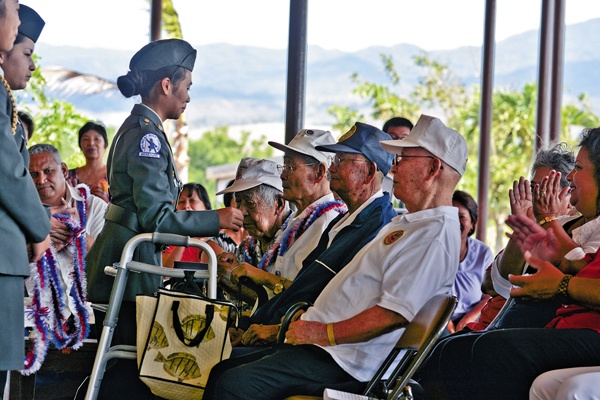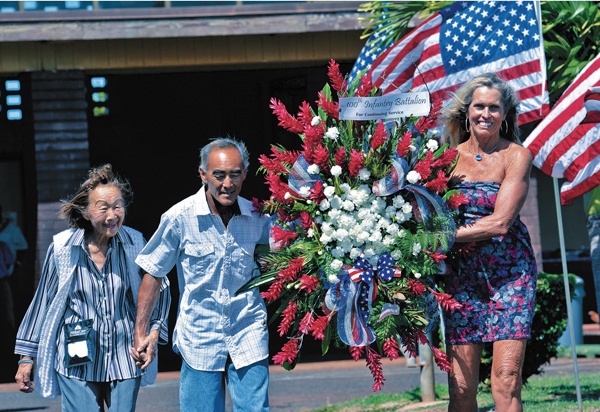HANAPEPE — Jack Hada can still remember making the decision to enlist in the military shortly after Pearl Harbor was bombed. The draft had just started, but Hada, who worked as a mechanic in Lihue at the time, said he
HANAPEPE — Jack Hada can still remember making the decision to enlist in the military shortly after Pearl Harbor was bombed.
The draft had just started, but Hada, who worked as a mechanic in Lihue at the time, said he didn’t want to take any chances.
He voluntarily enlisted shortly after the Dec. 7, 1941, attack that killed 2,400 soldiers.
“It’s not that I was brave,” said the now 95-year-old veteran, reflecting Sunday on his days from the 100th Infantry Battalion. “I just thought, ‘Get it over with.’”
Some, however, questioned his decision. They told Hada that volunteering didn’t mean he would get a straight route to the battlefield.
“At first, a couple people told me, ‘I know you volunteered, but that doesn’t mean that you’re going to get anything better,’” Hada said. “And I said, ‘No sir.’”
At the time, he said there was a mistrust of Japanese Americans following the bombing. No other jobs were available for Japanese workers to take if they decided to leave the island’s plantations — the only option was yard cleaning for men and house work for women.
“There were no other jobs,” Hada said. “That’s how it was and we went to correct that.”
Plenty of challenges laid ahead, he said, after he and hundreds of other nisei — American-born sons of Japanese immigrants — from Hawaii in the 100th Infantry Battalion prepared to go into combat.
They trained rigorously for nearly nine months on the Mainland, just like nearly every other solder, before they were given an assignment, according to the Go For Broke National Education Center.
Yet, their government didn’t trust them at first.
“We wanted to go to the South Seas to fight the Japanese but they didn’t trust us,” Hada said.
“We had to beg and beg and beg, because we like go fight. It’s not that we were brave — we were just as scared as anybody else — but we had to spill blood. No can help. That’s why, as the 100th, we had to sacrifice. We no like make (die) but somebody had to spill some blood.”
By the end of the war, 650 soldiers were killed in action and another 3,713 others from the 100th Infantry Battalion and 442nd Regimental Combat Team, which joined forces with the 100th Battalion in August of 1944, were wounded in five campaigns across Europe, including Italy, France and Germany.
On Sunday, Hata along with nearly 70 other veterans, family members and friends gathered at the Kauai Veteran’s Cemetery in Hanapepe to remember these sacrifices and commemorate those who have died over the years.
The sound of taps, played by a bugler from Waimea High School’s JROTC program, resounded through the cemetery as light winds rushed through the pavilion, where everyone who gathered stood in silence.
The annual memorial ceremony, now in its 68th year, is hosted by the West Kauai Club 100 and is held each year on the Sunday closest to Sept. 26 — the date the battalion suffered its first killed-in-action casualty after being deployed to Europe.
“These are the guys who paved the road, actually, and (we) should be really thankful we had these guys,” West Kauai Club 100 President Ken Morikawa said before the memorial service began.
“It gives me goosebumps to say that without these guys, we wouldn’t be where we are today both physically and mentally. Without these guys, the world would not be free.”
As Morikawa, the son of 100th Battalion veteran Kazuyoshi “Muggsy” Morikawa, read the 45 names of deceased Kauai veterans from the “One-Puka-Puka” — the infantry battalion’s nickname — friends and family members placed a single white carnation into a wreath commemorating the U.S. Army unit.
Pacific Missile Range Facility Commanding Officer Capt. Bruce Hay, who spoke at the memorial service, commended the men for their “nearly superhuman exploits” made during World War II.
“I’m honored to be here today speaking to a group of real American heroes, their families and their friends,” Hay said. “You now have another person to keep the history of the battalion alive — to tell their story to all who will listen.”
Gov. Neil Abercrombie and Congresswoman Tulsi Gabbard also issued separate statements commemorating the men and their unit for their bravery and perseverance.
“Your unwavering commitment and love for our country has left a legacy of gratitude for generations to come,” Gabbard’s liaison Kaulana Finn read from a statement. “No one can question the loyalty of these great soldiers to the United States. We will forever remember their successes.”
Brandi Yamamoto, the granddaughter of 100th Infantry Battalion veteran Kungo Iwai, sang the 100th Battalion’s theme song “Wind Beneath My Wings” during the memorial service.
Yamamoto said she wants everyone to remember the sacrifices that everyone in the armed forces has made.
“It gets harder and harder to not cry, because from when I started singing for them about five years ago, the numbers of the veterans have started dropping — they’re all getting older and passing away,” Yamamoto said. “I’m just very grateful and I express myself the best through song.”
There are only seven listed World War II survivors from the 100th Infantry Battalion and 442nd Regimental Combat Team on Kauai, including Hada, Thomas Arakaki, Bunkichi Matsuyoshi, Fusetsu Miyazaki, Monty Kazuma Nishiie, Masao Yotsuda and Kazuo Senda.
Hada, who served as a corporal technician during World War II, insists he was only doing his job when he served his country.
“Don’t thank me,” Hada said. “Thank those people out there who make (died) already. It’s because of them that we’re alive.”
• Darin Moriki, staff writer and photographer, can be reached at 245-0428 or dmoriki@thegardenisland.com. Follow him on Twitter at @darinmoriki.



